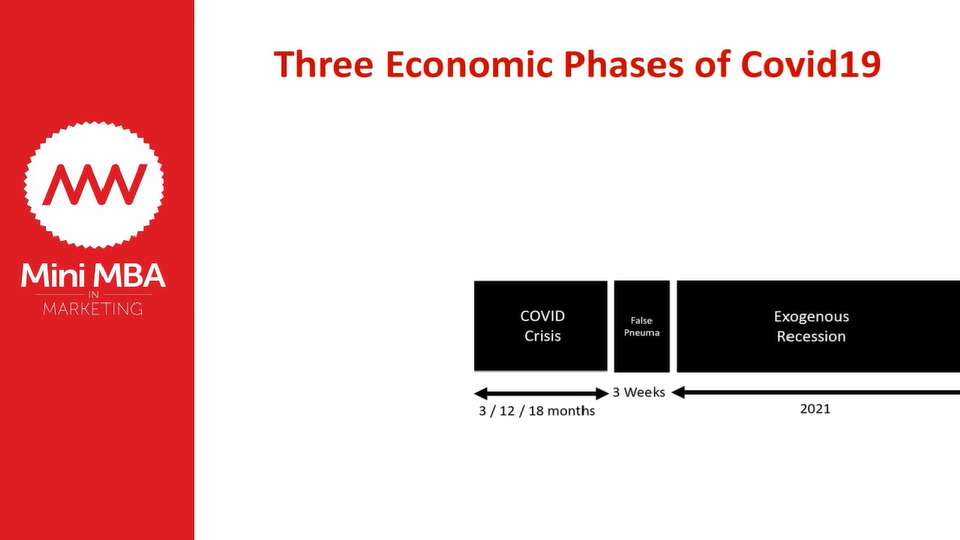Despite winning my year 12 economics prize (thanks Mr Rennie) I have no idea how the Coronavirus will impact industries and markets long term. I think a lack of knowledge is affecting marketers across all industries.
We can't say with any confidence what will happen next week, let alone any further down the road from that. It's impacting the way that we advise our businesses, the way we conduct our projects and how we reach out to our markets.
It's made marketing strategy hard here at Passle, we're a lean team and needing to respond fast has made it difficult to keep the big picture in mind. A strategy is difficult to conceive when you have limited ability to predict what will happen and no time to model or test.

I found this webinar very very useful from Mark Ritson at Marketing Week (former marketing professor at MIT & London Business School). In it, he breaks down the upcoming phases of the pandemic and how to adjust marketing approaches.
Phase One - Crisis
The first stage should be one we are familiar with. This is where we are now with large-scale sweeping changes to the business landscape happening every day. As lawmakers and firms adjust, clients and markets are vulnerable, anxious and frantically trying to adapt.
Do's in a crisis
- Be as human and understanding of the different situations firms are in
- Demonstrate to your clients that you understand their specific challenges
- Communicate and look after your staff, current clients and the wider community
- Continue to be in front of mind of client and prospects that need help
- Continue with the best practices that work
What to avoid
- Ambulance chasing, opportunism & brand-damaging tone deafness
- Generic, meaningless communications - don't add to the noise
- Losing sight of the big picture that people are losing their lives & livelihoods
Phase Two - False Pneuma
This is a professor's way of saying that everything will seem back to normal, but it will be a false improvement. Life will be returning to normal, people will be returning to normality as restrictions relax.
Do's during the false pneuma
- Maintain a cautious and watchful attitude, be prepared to shift back to crisis mode
- Analyze what learnings you can take from what worked (and what didn't)
What to avoid
- Sweeping statements about how "everything has changed"
Phase Three - Exogenous Recession
The reason that things won't return to usual is that the global economy has taken a serious kick in the guts. Usually, recessions are of course caused by natural economic fluctuations. This is different as it is caused by external factors. This is the lasting and most critical phase where the decisions and strategy taken will set market positions for a long time to come.
The most critical element here is to keep marketing as much as possible during this phase, market share is more valuable and important to stress than raw growth. As industries grow, those firms that are able to increase their marketing spend are able to recover faster and maintain a better market share post-recession.
Research from Roland Vaile showed this after the 1920s after the Great Depression and has since been supported by research into the major recessions following.
After the 1973-1975 energy crisis, Toyota was able to take the top spot in US imported cars and cement global domination for the next 50 years.
During 1990-1991 recession Pizza Hut and Taco Bell were able to maintain their marketing spend and saw 40%-60% increase in sales, whilst McDonald's, the much stronger brand decreased its spending and was a commensurate 28% decrease in sales.
The broad takeaway here I have is to do as much as you can to continue with the marketing activities that work, where possible transition spend rather than drop them and remember that there are different responses to the stages of the pandemic.





/Passle/53d0c8edb00e7e0540c9b34b/MediaLibrary/Images/2025-06-24-15-50-59-531-685ac963d81bf11b7522dd8e.png)
/Passle/53d0c8edb00e7e0540c9b34b/MediaLibrary/Images/2026-01-26-00-33-49-963-6976b66dc26ba4a239c0742b.jpg)
/Passle/53d0c8edb00e7e0540c9b34b/MediaLibrary/Images/2026-02-05-19-17-38-445-6984ecd2d522dbbaed5fa13c.png)
/Passle/53d0c8edb00e7e0540c9b34b/MediaLibrary/Images/2026-02-04-15-05-10-466-69836026ae0e4cf738ed4f9f.png)
/Passle/53d0c8edb00e7e0540c9b34b/MediaLibrary/Images/2026-02-01-16-17-51-126-697f7cafc6793e6990c55114.JPG)



